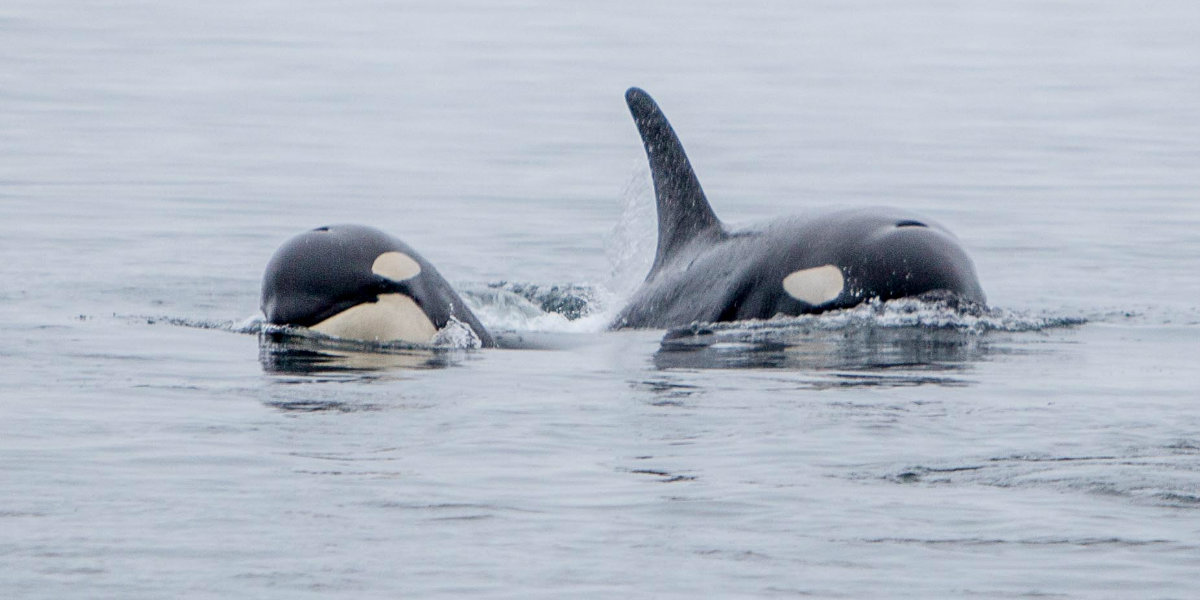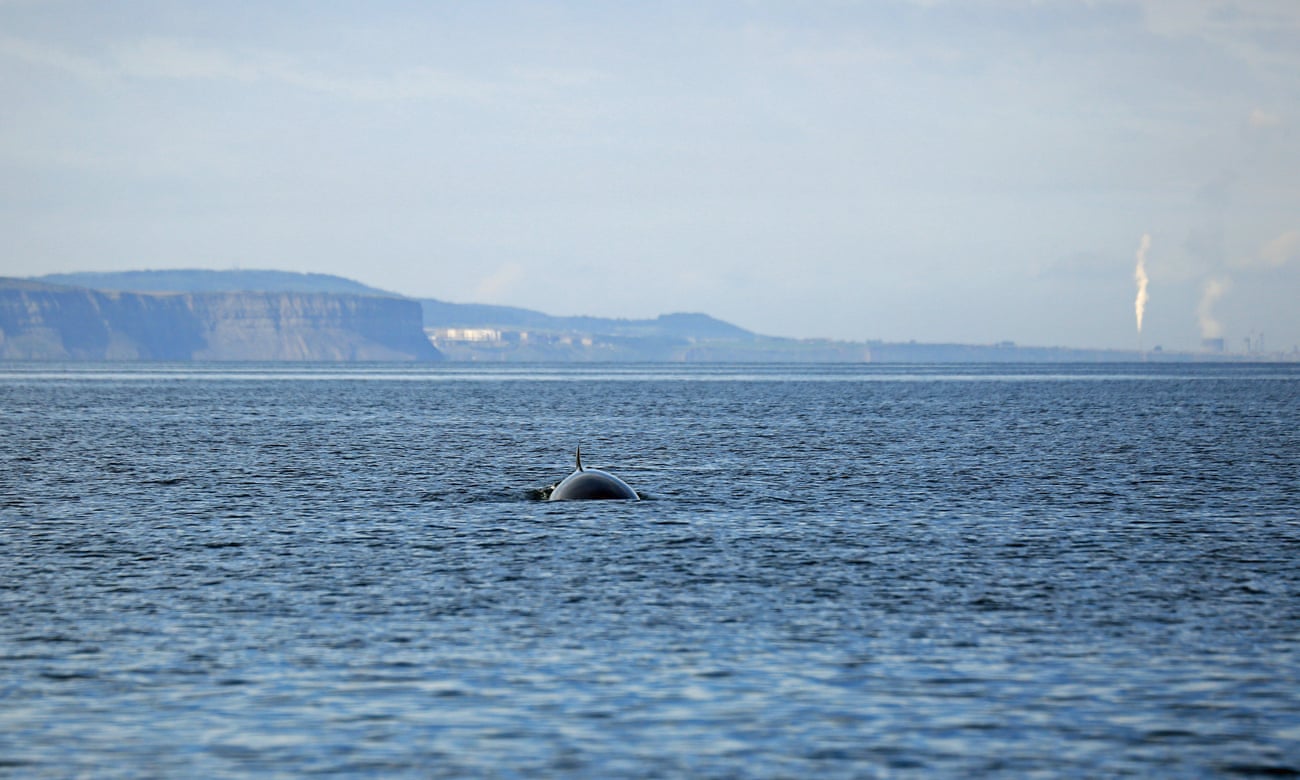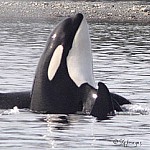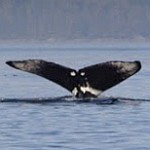Humpback Whales May Not Migrate South
Some of the Resident, fish eating Orca, who are not actually “resident” but travel farther afield, were seen in Discovery Passage. Since we did not have confirmation if these were again, Southern Residents from J and L pods foraging, or Northern Resident Killer Whales searching for food, we have had to list them in the Unidentified segment of this report. There were also a few Transient Biggs Orca on the hunt for seals, sealions, or the smaller Cetaceans such as the Pacific White Sided Dolphins that round out this report.
Please remember to report your sightings so that we can monitor and map the Whales, Dolphins, and Porpoise. Our work continues year round, and many of our sightings come from shore based observers like you.
Susan MacKay, Wild Ocean Whale Society
Our live camera feed is at YouTube Channel Live Link. We still have transmission problems causing the intermittent bouncy images from the Beach Gardens Marina camera which would translate to static for our hydrophone (underwater listening) stream. We continue to work on a resolution. You may also have noticed that we have a second live stream that appears when the Beach Gardens camera is down. This is a lesser quality camera we have as a backup mounted in Powell River. We still managed to have a couple of whale sightings from both cameras.
Thank You to all our hardworking volunteers and contributors! We’d also like to welcome our new volunteers who have started training.
Our team of online Volunteers continue to do a great job in making sure all your sightings reports are mapped and published regularly. Would you like to join us?
DONATE
to the non profit wild ocean whale society
Sightings Update
ISSUE SIGHTINGS MAP 2017-040
Jump to: Biggs Orca | Orca | Humpback Whales | PWS Dolphins | Species Unsure
TRANSIENT BIGGS KILLER WHALES
Sat Oct 14 2017
Wed Oct 11 2017
Jump to: Biggs Orca | Orca | Humpback Whales | PWS Dolphins | Species Unsure
UNIDENTIFIED KILLER WHALES
Sun Oct 15 2017
Thu Oct 12 2017
Jump to: Biggs Orca | Orca | Humpback Whales | PWS Dolphins | Species Unsure
HUMPBACK WHALES
Tue Oct 17 2017
Mon Oct 16 2017
Sun Oct 15 2017
Sat Oct 14 2017
Fri Oct 13 2017
Thu Oct 12 2017
Wed Oct 11 2017
SIGHTING MEDIA
SIGHTING MEDIA
SPECIES SUPPLEMENT
SPECIES SUPPLEMENT
SPECIES SUPPLEMENT
SPECIES SUPPLEMENT
Jump to: Biggs Orca | Orca | Humpback Whales | PWS Dolphins | Species Unsure
PACIFIC WHITE SIDED DOLPHINS
Tue Oct 17 2017
Sun Oct 15 2017
Thu Oct 12 2017
Jump to: Biggs Orca | Orca | Humpback Whales | PWS Dolphins | Species Unsure
SPECIES UNSURE
Tue Oct 17 2017
SUBMIT sightings
or call 1-877-323-9776 or eMail
we welcome your sighting reports, photographs, video and audio recordings. please review our media submission guidelines
Dive into over 5,000 Cetacean Sightings, images, videos and audio recordings reported in our Sightings Updates with the WOWS Sightings Archive Explorer
Archive Explorer takes readers into the Cetacean world of the BC Coast. Easily view all Cetacean sighting reports together with all sighting photos and videos:
• View species such as Humpback, Grey Whale or Dalls Porpoise
• Follow the endangered Southern Residents Orca in the Salish Sea
• Search for encounters with T002C2 Tumbo
• Goto Port Alberni to watch a close-up video of Orca in the harbour
• Track the T010s Transients as they hunt and travel the inside passage
• Check-Out “KC”, the ever popular Humphack and track his whereabouts this past August
• Goto one of 12,000 named locations on the BC and WA State coast
• Print custom sighting reports and maps (Coming Soon)
Explore this powerfull new research tool with the Archive Explorer Help page
Note: The Cetacean Sightings Archive is also available in database format together with sighting photo and video links for viewing, query and download here
Send your Comments and Questions to: Archive Explorer Feedback
The Magazine
REGIONAL
Both countries list this transboundary population as endangered, citing three primary risk factors: lack of the whales’ preferred prey, Chinook salmon; chronic and acute underwater noise and physical disturbance (e.g., from ferries, commercial ships, whale-watching boats, fishing boats, and recreational traffic); and high levels of contaminants, including polychlorinated biphenyls. Consequently, under existing conditions of food availability, pollutants and vessel traffic the Southern Residents face a highly uncertain future. Routine starvation of whales is one grim manifestation of these cumulative human caused disturbances.
"There are some short-term things that can be done – they’re practical, well-supported and cautionary," Vancouver Aquarium whale researcher Lance Barrett-Lennard told a federally sponsored symposium on the killer whales. "We’d better stop talking about them and start doing them."
John Ford, an emeritus federal scientist who now teaches at the University of B.C., agreed that sport fishing and whale-watching boats can physically interfere with the whales’ ability to hunt, including their key summer prey, chinook salmon.
"They need space," he said. "If there is a flotilla of boats around them, no matter what (the boats are) doing … they represent physical obstacles in these key spots."
In Washington state, there is a strict law that prohibits boats from approaching killer whales within 200 yards, yet on the B.C. side of the Salish Sea, there is only a guideline of 100 metres and a hard-to-prove prohibition against harassing or disturbing the whales….
"They have just come back like gangbusters. They’re in this area and people are seeing them more and more frequently," said Cedric Towers of Vancouver Whale Watch. "One or two whales we’ve been seeing now for five or six years in a row."
A pair of humpback whales was spotted near Galiano Island as recently as Wednesday….
Scientists from Fisheries and Oceans Canada said the juvenile male had its lower jawbone dislocated after being hit with significant force.
“When I hear it’s a vessel strike I’m not too surprised because the number of humpbacks are increasing in B.C.,” marine biologist Wendy Szaniszlo of the Vancouver Aquarium told CHEK News.
Malnutrition suspected in death of young killer whale
Orca found on Sunshine Coast died of blunt force trauma, DFO says
“If that’s what happened then it sounds like it was probably a ship versus a smaller vessel, and ship strikes further offshore have been known to kill larger whales.”
Curtis Fendelet, who owns the Mussel Beach Campground where the humpback washed up last week, said the carcass has attracted a lot of attention.
Fendelet said scientists from Fisheries and Oceans Canada took note of the dislocated jawbone when they took samples from the dead animal.
“They took some blubber samples and stool samples from the humpback and took an eyeball to see if it was stressed before it died.”
NATIONAL & INTERNATIONAL
But new footage filmed off the coast of Sri Lanka by pro whale photographer Patrick Dykstra, in conjunction with blue whale scientist Howard Martenstyn, may be a first. Their video shows what they believe is the first known clip of a blue whale “heat run.”
Heat runs have been well documented in humpback whales, but no known footage exists of the behavior in blue whales (or at least that Dykstra or National Geographic could find).
• Watch VIDEO
These aren’t trained humpbacks, pirouetting for the pleasure of onlookers. Instead, these massive beasts are hunting using an ingenious method known as bubble-net feeding. A new video that surfaced on GoPro’s blog shows its Karma drone capturing the whales in action just west of the Maskelyne Island in British Columbia, Canada….
I had already sold my home county’s charms long enough, so I decided against landing another killer blow: God’s own county has whales, too. Sean Baxter, a fisherman who lives in the village of Staithes, has been encouraging me to search them out for years. "The summer herring shoals are back," he told me recently. "We’ve got all sorts of marine life living off them: minke whales, porpoises, dolphins, basking sharks – even humpbacks and sunfish some years."
This was another reason why I failed to mention the Yorkshire leviathans: I had never clapped eyes on them myself. Surely Yorkshire whale-watching could not be a patch on places with exotic names like Kaikoura, Anacortes and Isle St Marie? How could Yorkshire ever compete? Baxter was adamant that it could. There was only one way to test it out….
The research, largely done at the University of British Columbia, sheds new light on similarities between whale and human evolution.
“Similar pressures and possibilities in the environment can select for a similar outcome,” said Kieran Fox, now a postdoctoral student at California’s Stanford University and co-author of the new paper in Nature Ecology and Evolution….
A new study which looked at 90 species found a link between brain size and social and cultural traits in marine mammals.
It is the first time that scientists have considered whether “social brain hypothesis’ applies to whales and dolphins, as well as humans. The theory suggests that intelligence developed as a means of coping with large and complex social groups.
Listen to the full discussion and subscribe to the Deep Trouble podcast from the CBC Podcast page or subscribe to the podcast in iTunes.
A record number of endangered North Atlantic right whales died this summer, most the apparent victims of ship collisions. Others whales got entangled in fishing lines.
Whales seemed at greatest risk in the Gulf of St. Lawrence. As deaths mounted, the federal government made emergency changes to protect the animals – a mandatory slowdown of large ships and an early closure of a snow crab fishery, hoping to regulate the human activity linked to the problem.
• CBC Podcast page
Magazine Submissions
the magazine accepts submissions of links to published articles and media of interest to our readers. we welcome original articles, letters, notices, photography, video and audio
SUBMIT
to the magazine
original material guidelines
notices: 100 words max.; letters & articles: 500 words max.
you or your organization must be authors of the work and are solely responsible for its content. the magazine gives no assurance material submitted will be published. media submission guidelines
DONATE
to the non profit wild ocean whale society
VOLUNTEER
review our volunteer opportunities
SUBMIT sightings
or call 1-877-323-9776 or eMail
we welcome your sighting reports, photographs, video and audio recordings. please review our media submission guidelines
SUBSCRIBE
receive sightings update eMail notices
CONTACT
the wild ocean whale society









